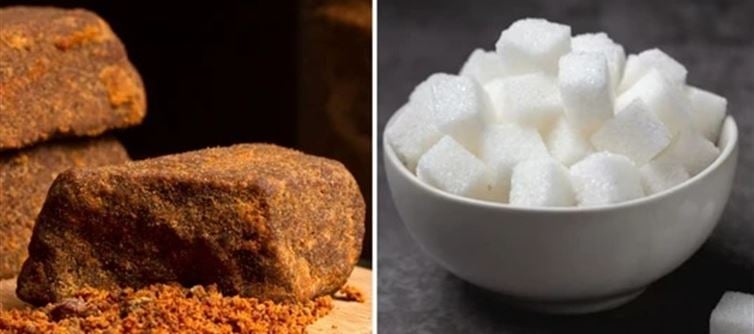
Fortunately, there are plenty of sugar alternatives, such as jaggery. However, is it truly "healthier" than white sugar that has been refined?
Jaggery vs sugar
Karan Sarin, a metabolic health coach, revealed a "sweet lie" regarding jaggery in an interview with HT Lifestyle. "It's normal. It isn't polished. 'Medicinal sugar' is also a moniker for it. Generation after generation of indians have believed that jaggery is the healthier cousin of refined white sugar, he said.
According to karan, jaggery initially appears to be superior to white sugar. However, does it actually improve blood sugar levels? "Jaggery is not a free pass for anyone dealing with insulin resistance, diabetes, or just trying to protect metabolic health," karan stated. Since sugar is ultimately the new tobacco, it falls squarely into the category of strictly moderate consumption, just like all other added sugars.
Because it undergoes less processing than refined sugar, which is almost pure sucrose, jaggery preserves traces of minerals like iron, potassium, magnesium, and some antioxidants. This has contributed to its health-conscious image, which is frequently marketed as a vitamin source rather than merely a sweetener," he continued.
'Jaggery is still mostly sugar'
This is where it becomes awkward, though. jaggery is still primarily sugar when we look at its molecular makeup; depending on the variety, it contains anywhere from 65 to 90 percent sucrose. It has almost the same number of calories as white sugar. And in terms of metabolism? The true surprise comes thereafter," karan remarked.
The glycemic index (GI), which gauges how rapidly a food raises blood sugar, paints a different picture, according to Karan: "The most widely consumed sugarcane jaggery scores much higher, frequently around 84 or more, than white sugar, which clocks in at approximately 65. Simply put, it causes a greater rise in blood sugar than the refined sugar it is meant to replace.
"I used continuous glucose monitoring to test this myself," he continued. The jump in my blood sugar response to tea sweetened with conventional white sugar and jaggery was almost the same: it was strong, quick, and considerable. The notion that jaggery causes a more gradual rise in blood sugar just didn't hold up.
'This isn't simply my experience,' karan remarked. There was no discernible change in the post-meal blood sugar levels of individuals with type 2 diabetes who used coconut jaggery and cane sugar, according to a 2022 study (published in the Journal of Future Foods). He claimed that there was no discernible metabolic benefit in glucose regulation from even the purportedly superior types of jaggery.
What about those antioxidants and minerals? "Yes, they do exist," karan answered. However, at typical serving sizes, the amounts are insufficient to have a significant impact. You would need to consume levels that would make blood sugar control difficult in order to receive any significant nutritional advantage.
What are the safer options?
Karan went on to say that not all jaggery is made equally. It has been demonstrated that some palm jaggery, such as palmyra palm jaggery, has a lower GI of about 35. However, this variant is much less prevalent. Sugarcane-based jaggery, the high-GI type that most people are unaware they are eating, still makes up the great bulk of jaggery sold commercially in India. Some natural, calorie-free sweeteners, such as stevia, allulose, and monk fruit, provide sweetness without noticeably increasing blood sugar levels for people seeking safer alternatives, he noted.
"Your body doesn't distinguish between sugars based on how artisanal or traditional they sound," karan says, adding that jaggery may seem more natural. Once inside, it recognizes fructose and glucose and reacts appropriately.
Disclaimer: Readers should be aware that this article is merely meant to be informative and should not be used in place of expert medical advice. If you have any queries concerning a medical problem, you should always consult your doctor.




 click and follow Indiaherald WhatsApp channel
click and follow Indiaherald WhatsApp channel